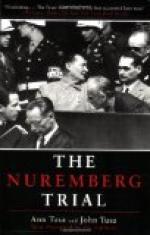|
This section contains 520 words (approx. 2 pages at 300 words per page) |

|
1945
February: President Franklin Roosevelt, Prime Minister Winston Churchill, and Premier Joseph Stalin meet in Yalta and agree to prosecute Axis leaders for war crimes at the conclusion of World War II.
April 30: Adolf Hitler commits suicide in his Berlin bunker.
May 2: President Harry Truman appoints Associate Supreme Court justice Robert H. Jackson as chief U.S. counsel for the prosecution of Nazi war criminals.
May 6: Reichsmarschall Hermann Goring surrenders to the Allies.
May 7: General Alfred Jodl agrees to Germany's unconditional surrender, ending World War II in Europe.
May 23: British troops capture Flensburg, Germany, and capture several top Nazi officials who later would be tried at Nuremberg; Hitler's top aide, Heinrich Himmler, commits suicide.
June 26: Jackson and his counterparts from Britain, France, and the Soviet Union meet in London to decide how to proceed with the prosecution of the Germans responsible for the war.
July 7: While the Soviets advocate...
|
This section contains 520 words (approx. 2 pages at 300 words per page) |

|




